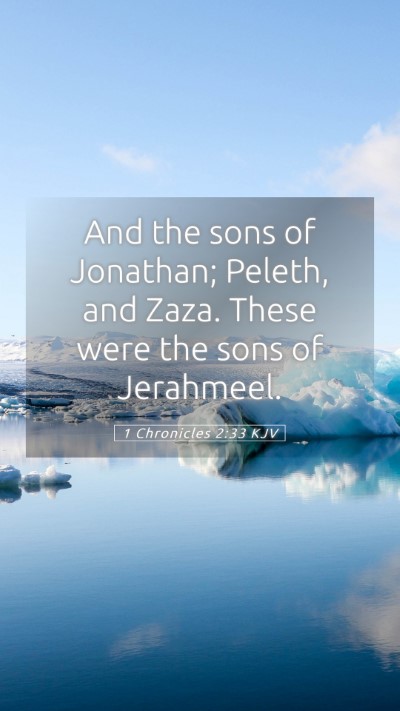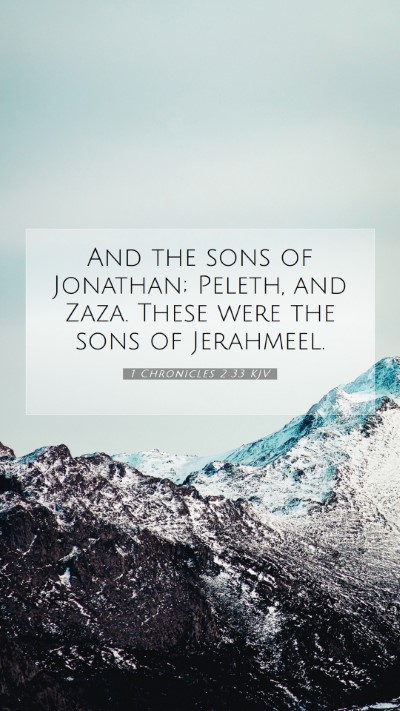Bible Verse Meaning of 1 Chronicles 2:33
Verse: "And the sons of Jonathan; Merib-baal; and Merib-baal begat Micah." (1 Chronicles 2:33)
This verse focuses on the lineage from Jonathan, specifically mentioning Jonathan's son, Merib-baal, and his descendant Micah. The key elements in this genealogy reveal important insights into the nature of divine promise, family inheritance, and the unfolding of Israel's history.
Understanding Scripture
The genealogy in 1 Chronicles serves not only to provide a historical record but also to highlight the significance of familial connections in the context of God's covenant with Israel. As noted by Matthew Henry:
"In the genealogies, we often see God's providential hand ensuring that the lines of faith and duty are kept pure and intact." - Matthew Henry
Bible Verse Interpretations
From Albert Barnes' perspective:
"The mention of Merib-baal is significant as it signifies the restoration and continuation of King Saul's lineage despite the tumultuous events surrounding his kingship." - Albert Barnes
Scripture Analysis
Adam Clarke adds depth by highlighting the implications of names and ancestry:
"Understanding names like Merib-baal (meaning 'the Lord is a conflict') gives insight into the struggles faced by the descendants of Saul and points to the overarching theme of conflict and redemption in Israel's history." - Adam Clarke
In-Depth Bible Verse Analysis
- Genealogical Importance: Genealogies in the Old Testament often serve to establish continuity and legitimacy in leadership and property rights, as well as to confirm the faithfulness of God’s promises across generations.
- Character Representation: Merib-baal’s lineage raises questions about the spiritual state of his descendants, especially in relation to the legacy of his father Jonathan, who was a faithful and loyal friend to David.
- Divine Providence: This verse exemplifies how God’s plans continue to unfold through specific families, even amidst varying circumstances and predicaments in ancient Israel.
- Context of Conflict: The mention of Merib-baal illustrates the personal conflicts that often accompany hereditary lines, linking back to larger themes of sin, conflict, and the need for redemption.
Application of 1 Chronicles 2:33
This verse serves to remind readers in contemporary contexts about the importance of family heritage and divine promise. It invites reflection on how present-day individuals may find themselves in the lineage of faith due to historical events that shape their spiritual journey.
Bible Study Insights
When studying this verse within group settings or online Bible study platforms, consider:
- Analyzing how the genealogies reinforce God’s faithfulness.
- Examine the role of Jonathan's legacy and its implications for leadership qualities in the subsequent generations.
- Discuss the significance of names in the scriptures and how they relate to character and destiny.
- Explore how understanding the historical context of this verse can apply to modern life challenges, particularly regarding family dynamics and spiritual inheritance.
Cross References
This verse connects with various other scriptural texts that reflect on similar themes:
- 2 Samuel 9:6-7: This passage relates to Merib-baal’s compassionate legacy by David's kindness toward him.
- 1 Chronicles 8:34: Highlights genealogical records tracing the lineage from Benjamin, crucial for understanding the broader context of Israel's history.
- Acts 13:22: God's choice of David as a man after His own heart, anchoring the throne's legitimacy and the interpretations surrounding lineage.
Conclusion
Overall, 1 Chronicles 2:33 offers profound insights that extend beyond mere historical records. It challenges readers to consider the broader narrative of God’s promise, the struggle inherent in human lineage, and the faithfulness of God throughout generations. Understanding Scripture in this way provides a richer experience in Bible study, encouraging deeper exploration of biblical exegesis and the meaning of Bible verses in our lives today.


